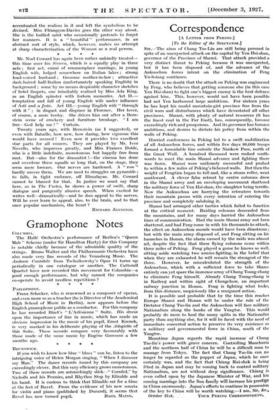Mr. Noel Coward has again been rather unkindly treated— this
time over his Sirocco, which is a squally play in three acts ; first act, ennui of commonplace marriage, in young English wife, lodged somewhere on Italian lakes ; strong loud-voiced husband ; tiresome mother-in-law ; attractive dark-haired half-Italian (unfortunately speaking English) in background ; some by no means despicable character sketches of hotel limpets, one inimitably realized by Miss Ada King, as an English spinster with forlorn memories. Act II.— temptation and fall of young English wife under influence of Asti and a festa. Act III.—young English wife " through with it " ; in disgust and disgrace in Florence. Her lover, of course, a mere booby. She drives him out after a Bern- stein scene of crockery and furniture breakage. " I am free—God help me ! " Curtain.
Twenty years ago, with Bernstein (as I suggested), or even with Bataille, how new, how daring, how vigorous this would have seemed ! Even now it provides two excellent star parts for all corners. They are played by Mr. Ivor Novello, who improves greatly, and Miss Frances Doble, who is a little indefinite, monotonous but happily free from rant. But—alas for the dramatist !—the cinema has done and overdone these squalls so long that, on the stage, they seem mere breezes. Our nerves are hardened. A " row " hardly moves them. We are used to struggles on pyramids ; to falls, in tight embrace, off Himalayas. Mr. Coward cannot be blamed for that. In justice we must say that here, as in The Vortex, he shows a power of swift, sharp dialogue and pungently abusive speech. When excited he writes well—dramatically—and he does appeal to the nerves. Will he ever learn to appeal, also, to the brain, and to that once popular mechanism, the heart ?
RICHARD JENNINGS.










































































 Previous page
Previous page